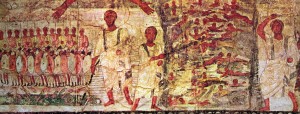Anti-Semitism in the Hellenistic World
 Lawrence H. Schiffman, From Text to Tradition, Ktav Publishing House, Hoboken, NJ, 1991.
Lawrence H. Schiffman, From Text to Tradition, Ktav Publishing House, Hoboken, NJ, 1991.
The Hellenistic period saw the rise of many of the elements of classical anti-Semitism. From a later perspective, anti Semitism has two basic features; one is economic and social, and the other is the motif of the Jew as Christ-killer. While the second, quite obviously, had to await the rise of Christianity to begin its ignominious career, the economic and social aspects began to surface in the Hellenistic Diaspora. Judaism was regarded as a barbarous superstition, and various canards were circulated describing its allegedly disgraceful beginnings. Among the main targets were Moses and the commandments, especially circumcision. Jews were said to be misanthropes who hated all other people, and it was claimed that there was an idol of an ass in the Holy of Holies. Even more damaging was the first blood libel, an accusation that Jews sacrificed a foreigner every seven years for ritual purposes.
It is always possible to advance explanations for anti-Semitism. We may speak of the role of the Jews, an aspect to some extent retrojected from medieval Jewish history. We may also note that many non-Jews saw their Jewish neighbors as strangers and resented the special privileges they enjoyed without becoming full members of the polis. Perhaps even more unacceptable was the Jewish refusal to worship the pagan gods, and, therefore, to join in the local city cults.
Yet anti-Semitism seems to transcend history; and no explanation suffices to explain it. New circumstances change some of its details from time to time, but the dominant motifs and accusations persist no matter how often they are shown to be false and no matter how much Jews may assimilate. In Hellenistic times, Jews lived in close relations with their neighbors, but they were soon to confront the most serious blood libel accusation of all, that of deicide. Ultimately, these tensions would lead to the Diaspora revolt of 115–117 C.E.



